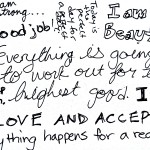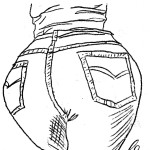We’ve all heard the Golden Rule before: “Do unto others as you would have them do unto you”, and its many variations. But, how valid is this rule and it’s impact on leading a happy, healthy and morally sound life? I look at lessons in homeopathy and ayurvedic philosophy for insight.
Ayurvedic philosophy states that the reason for abstaining from morally unsound deeds (lying, stealing, killing, etc.) is because, once one begins to engage in these acts, one begins to create a world in which these acts become feasible. In essence, the ayurvedic philosophers claim that we create our own reality: once we begin to steal and lie, we create a reality in which stealing and lying becomes possible and we run the risk of other people beginning to steal and lie to us.
This concept of creating your own reality is inherent in homeopathic theory as well. In homeopathy, in order to understand the case that a patient presents with we must examine every minute detail about the patient. If someone expresses a frustration about something or someone that appears distinct from themself (“people are liars” or “you can’t trust anyone”) they are really expressing a statement about themselves. Our professor Dr. Nadia Bakir tells us that in order to recognize something about our environment we are really recognizing it from a point deep within ourself. If we didn’t already embody this characteristic then we wouldn’t be able to observe it in others – it wouldn’t be a part of our reality. In some ways it makes sense, those who embody the characteristic of cynicism tend to see the negative side of life, ignoring the positive and even managing to manifest negative outcomes in their own life situations.
This means that, in order to live in a world where people are honest, thoughtful and generally concerned about others we must first work to cultivate those characteristics in ourselves. As Gandhi says “Be the change you wish to see in the world”.
It must be said that these concepts can be dangerous if we take them a step further and claim that people who are the victims of unfortunate accidents or deadly diseases “brought it on themselves”. However, there is some evidence that suggests people who think positively about their cancer diagnoses, for example, experience greater quality of life and a better prognosis.
This philosophy is not meant to undermine those who have experienced loss or are going through a difficult time. It only serves as an inspiration for those who wish to cultivate a better world and take some responsibility for their outlook on life. It’s important to understand that we don’t each live in our glass bubble. Our personal views manifest as actions and our actions affect other people, which in turn affect how those people react to us. So, in a sense there is some truth to “doing unto others as you would have them do unto you.”







Love it! From personal experience too I know that the things that annoy me most in other people (my mom, my partner) are the things within myself that I’ve disliked or wanted to change. It’s too odd. I just watched the documentary from the CCNM Library this weekend The Secret which is about The Law of Attraction and it totally fits in with all of the above. I would most definitely recommend it to a patient as homework because it explains the quantum physics behind it, as well as the – “Yes, you did attract everything in your life right now” even though we don’t want to blame victims, but more importantly it is very positive and leaves on a high note of how we can alter our reality. What we don’t realize is the Universe doesn’t understand “do” or “don’t,” all it knows is thought and thought attracts and creates reality. If you’re thinking, “I DON’T want to get into a car accident, I DON’T want to get into a car accident,” the energy waves you create are all about car accidents. Thus it’s not surprise you attract car accidents, and no surprise to me working at a physio clinic that many of my patients were victims of 2nd and 3rd motor vehicle accidents. Their fears surrounding the first accident meant they were always thinking about car accidents. We know scientifically now that the mind interacts with things and reality is created by a mind entering the system which is what the documentary talks about (the observer alters the experiment). We can use this all to our advantage to focus on the positive outcomes that we WANT rather than the negative things we Don’t want.
I love the Secret! It’s true that we live in a world perceived by our senses, integrated in our brain and compared against past experiences, expectations, observations, and previous beliefs. When we experience something novel we tend to explain our experience using already-learned beliefs. “Fat people are lazy and don’t take care of themselves” = “I met one or more fat people who I thought didn’t take care of themselves” and, now “I deserve to be overweight because I’m lazy and don’t take care of myself”.
I think it’s extremely important to realize that what most ticks you off about someone is most certainly an aspect of yourself that you don’t like or what to confront that you recognize in them. Rejecting this aspect of that person is, in a sense, a way of protecting yourself from confronting your shadow side.
The only beef I have about The Secret is that it’s extremely hard to change thought processes, especially when many of our beliefs and mental processes are hard-wired from a young age. If we grew up in a family of negative thinkers who believe that you can never achieve success unless you sacrifice your happiness and morals, well, then that’s probably the only way you’ll achieve success, it’s going to be hard-wired. How do we break through this cycle? I believe that practicing mindfulness meditation and learning how to recognize and identify our own ingrained thought patterns is key in being able to change them to more positive ones, and thus create a new potential for ourselves.